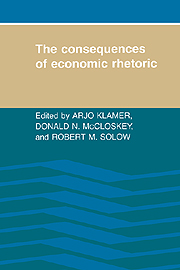Book contents
- Frontmatter
- Contents
- Preface
- The consequences of economic rhetoric
- PART I ECONOMIC RHETORIC: INTRODUCTION AND COMMENTS
- PART II ECONOMIC RHETORIC: FURTHER ARGUMENTS
- PART III ECONOMIC RHETORIC AMONG ECONOMISTS
- PART IV ECONOMIC RHETORIC IN POLITICS AND JOURNALISM
- 13 The heterogeneity of the economists' discourse: Philosopher, priest, and hired gun
- 14 The grammar of political economy
- 15 The rhetoric of economics as viewed by a student of politics
- 16 “Yellow rain” and “supply-side economics”: Some rhetoric that failed
- PART V ECONOMIC RHETORIC: ITS RHETORIC AND ITS CONSEQUENCES
- 1 Appendix: Other contributors and participants
- Index
15 - The rhetoric of economics as viewed by a student of politics
Published online by Cambridge University Press: 07 September 2010
- Frontmatter
- Contents
- Preface
- The consequences of economic rhetoric
- PART I ECONOMIC RHETORIC: INTRODUCTION AND COMMENTS
- PART II ECONOMIC RHETORIC: FURTHER ARGUMENTS
- PART III ECONOMIC RHETORIC AMONG ECONOMISTS
- PART IV ECONOMIC RHETORIC IN POLITICS AND JOURNALISM
- 13 The heterogeneity of the economists' discourse: Philosopher, priest, and hired gun
- 14 The grammar of political economy
- 15 The rhetoric of economics as viewed by a student of politics
- 16 “Yellow rain” and “supply-side economics”: Some rhetoric that failed
- PART V ECONOMIC RHETORIC: ITS RHETORIC AND ITS CONSEQUENCES
- 1 Appendix: Other contributors and participants
- Index
Summary
Before speaking about economists, let me distinguish two varieties of that clan. In what follows I am not referring to certain select categories of economists whose members do carry on conversations with political scientists: (1) Marxist political economists, (2) most European policy-oriented economists, (3) many and perhaps most economic historians, including Donald McCloskey and Charles Kindleberger, (4) organization theorists following the research program of Herbert Simon, (5) a few highly creative economists who are brilliant commentators (and rhetoricians) about politics (Albert Hirschman, Mancur Olson, Thomas Schelling, for example), and (6) some policy-oriented mainstream U.S. economists who are aware of the importance of politics for example, Jeff Sachs. I am talking about mainstream U.S. economists whom I encounter at meetings called by economists, on trade, international monetary coordination, or the like. At such meetings it is these economists who usually dominate the conversation.
But what goes on between them and students of politics – political scientists in McCloskey's sense (1985, p. 54) of “disciplined inquiry”? (Until I read McCloskey's book I shied away from using the term political science, associating science with the attainment of certainty. I thank him for allowing me to use the term with a straight face again.) Political scientists who study the politics of economic policy are highly receptive to economics as a way of thinking about problems – what Joe Kalt called the “marginalist view of the world.” We know that we need to understand some economics, and we respect the rigor of economic thought.
- Type
- Chapter
- Information
- The Consequences of Economic Rhetoric , pp. 240 - 246Publisher: Cambridge University PressPrint publication year: 1989

